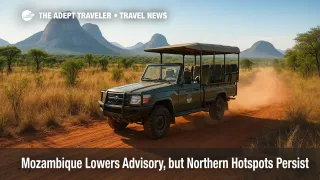Mozambique Lowers Advisory, but Northern Hotspots Persist

Mozambique's overall U.S. State Department rating has eased to Level 2: Exercise Increased Caution, reflecting calmer politics and fewer nationwide protests. Travelers, however, must still avoid the far-north districts where terrorism and insurgent violence continue. Cabo Delgado Province, the Niassa Special Reserve corridor in Niassa Province, and Memba and Erati districts of Nampula Province remain Level 4: Do Not Travel. Safari outfitters are rerouting game-drive loops west of the Lugenda River and, in some cases, shifting clients to camps in southern Africa while Niassa stabilises.
Key Points
- Why it matters: U.S. advisory downgrade widens travel-insurance coverage yet leaves key safari country off-limits.
- High-risk zones: Cabo Delgado, Niassa Reserve blocks, northern Nampula districts.
- Operators like Chapungu-Kambako Safaris are relocating guests to partner camps in Botswana, Namibia, and Zimbabwe.
- Niassa Carnivore Project has paused field work east of the Lugenda but continues conflict-response patrols in western concessions.
- Independent visitors still need security escorts on overland routes north of Pemba.
Snapshot
Mozambique stretches 1,430 miles from Tanzania to South Africa and blends Indian-Ocean resorts with vast miombo wilderness. The new Level 2 status reflects a lull in protest-related roadblocks around Maputo and Beira. Yet jihadist cells tied to Islamic State linger near gas projects in Cabo Delgado and occasionally penetrate Niassa Reserve, Africa's third-largest protected area. Air links into Pemba and Lichinga run normally, but bush-strip charters into eastern Niassa remain suspended. U.S. citizens can transit through major hubs with standard vigilance, packing proof of medical coverage and registering with STEP.
Background
The United States elevated Mozambique to Level 3 in 2022 amid election unrest and growing insurgent raids on rural posts. Joint Mozambican-Rwandan operations later pushed militants from Macomia toward the Tanzanian border. A spate of April 2025 attacks, including the torching of Chapungu-Kambako's L8 camp and the fatal assault on Niassa Carnivore Project rangers, prompted emergency Level 4 carve-outs. Recent intelligence suggests fighters have retreated from western Niassa, enabling the nationwide downgrade but not enough for blanket confidence. Cabo Delgado's Palma-Mueda corridor and the Memba-Erati pocket in Nampula still see ambushes on convoy routes and riverside villages.
Latest Developments
Advisory Downgrade Details
Washington's 16 June 2025 update cites "decrease of election-related protests" while explicitly adding Niassa Special Reserve to its Do Not Travel list. Visitors must weigh routine crime in Maputo against the very different threat of terrorism in the north. Most tour insurers now reinstate standard medical and cancellation cover nationwide, but policies still exclude the Level 4 zones.
Provinces Still at Level 4
- Cabo Delgado - full province off-limits; attacks near Palma LNG hub.
- Niassa Province - only the Reserve's eastern and central blocks remain banned.
- Nampula - Memba and Erati districts, plus adjoining coastal tracks. Government checkpoints tighten at Metoro and along the N380; expect vehicle searches and dusk-to-dawn curfews north of the Lúrio River.
Safari-Industry Response
Chapungu-Kambako Safaris has shifted bookings from its destroyed Kambako main camp to alternate lodges across southern Africa, offering credit or date changes without penalty. Fly-in operators now land at Mecula airstrip and confine drives to western escarpments, avoiding river crossings into Cabo Delgado blocks. The Niassa Carnivore Project has halted eastern telemetry runs but keeps community education and predator-conflict teams active near Lake Niassa. Outfitters require satellite comms, armed rangers, and med-evac coverage before confirming hunts.
Analysis
Mozambique's downgrade unlocks mainstream tourist interest-from Tofo's manta-ray dives to Gorongosa's rewilding safaris-yet the patchwork security map demands granular planning. Distances are huge; Pemba sits as far from Maputo as New York is from Miami. Travelers should stick to commercial flights rather than self-drives north of Nacala. Lodge chains now bundle charter flights, armed escorts, and same-day evacuation insurance into transparent "safety surcharges," raising safari costs 8-12 percent but restoring some confidence. Economy-boosting tourism remains critical to fund conservation salaries that deter poaching, so measured visits to safe zones can aid stability. Still, would-be hunters must accept fluid itineraries and be willing to pivot south at short notice. Families should consider malaria prophylaxis year-round and carry CDC-recommended yellow-fever cards if transiting Kenya or Tanzania. Lastly, review policies for political-evacuation triggers; many standard health plans exclude unrest.
Final Thoughts
Marching into peak dry-season safari months, Mozambique again beckons adventurous travelers-with caveats. Respect Level 4 red lines, vet operators' contingency plans, and keep registrations current. An informed, flexible approach lets visitors support wildlife and communities while heeding the updated Mozambique travel advisory.
